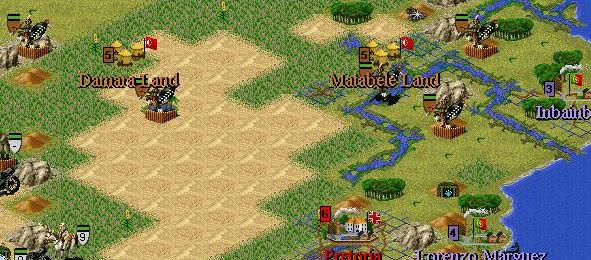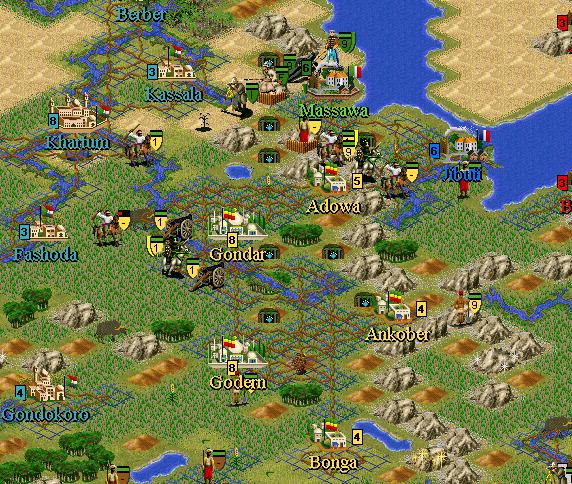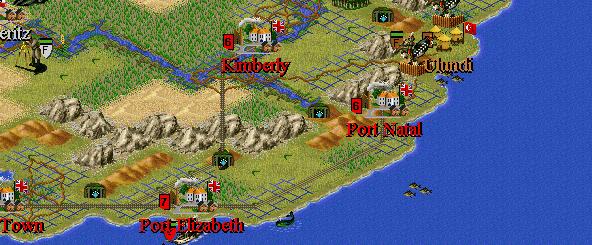General Information:
- Name of Scenario : Brown Man’s Burden
- Final Score : 25.0/30
(Breakdown: 0-10 terrible /11-15 Average/ 16-20 Good/ 21-25 Excellent/ 26+Best possible) - Type of Scenario :Historical
- Name of Author: Carl Fritz
- Name of Reviewer: Morten Blaabjerg
Summary of Scenario:
| Pile on the brown man’s burden, and try and claim all of Africa for your nation, before the others do! |

Playability – Section Sub-total: 5/5
|
This The scenario extends this time
The tribes are the English, Germans, Italians, Mahdists, Ethiopians, |
Units – Section Sub-total: 5/5
|
Most One favorite tactic of mine, was the The strategy and combination/balance of units is in my opinion superb. Graphics wise the units are very nicely done. |

Research – – Section Sub-total: 4/5
|
The tech tree was partly altered to suit the theme, while most of the classic tech tree remains unaltered. The rate for tech development was slowed somewhat, to a nearly perfect level, that suits the game. I noticed something funny about the cathedrals, and I’m not sure, but it seems to be an incident of "monotheism" not correctly applied to the building of cathedrals, which makes these dysfunctional. But as said, I am not sure, and I haven’t checked, as it is not so great a problem, when the game plays and you forget things like this. And it could be intentional. Islam was in many places much more successful than the Christian missionaries proved to be; I usually built Mosques instead (Coliseum), which work out perfectly. There are a bunch of wonders as well in strategically placed cities, as well as a few still buildable, including "Stanleys Expeditions" (a free advance), etc. All seem to work quite balanced, and add to the atmosphere of it all. |
Map & Terrain – Section Sub-total: 3/5
|
I wasn’t so impressed with the map, but it works and looks ok. There are a few new graphics which look quite good, including the mountains, deserts and hills. And some that look a little out of place. While the setup geographically might be slightly disappointing, the strategical setup is much better. It takes some consideration as to how to conquer cities that lie in the middle of the jungle, with no roads etc. I would personally have liked to see more difficult strategical set-ups with use of the terrain, like the one in the Sudan and Ethiopia, which is set up superbly using the mountain ranges as an effective barrier for easy European conquest. So that the geography of the continent would constantly prove a challenge to the European nations, like was the case historically. Railroads somehow seem to make it a little too easy. -And yes, there were railroads built in Africa during this period, but only with great difficulty, because workers were lazy, and the sicknesses and hazards from opening up the interior proved a tremendous challenge. Another approach could have been sailable rivers, on which you could launch steamers to control an area, which was used historically on the Nile, as well as the Congo, to reach the interior. |

Care & Details – Section Sub-total: 4/5
|
Carl Fritz must be said to be a veteran in the field of scenario design, and this scenario proves this too. As said, this scen is enjoyable, as well as challenging and balanced. But it is also full of all kinds of surprises and nit-bits of humor, including the altering of the advisors, and the icons are appropriately changed, where needed. There are a load of random events which replay some of the great incidents of the "Scramble", like the Kitchener campaign against the Mahdists, the Boer War etc. Most of these events doesn’t have a major impact on gameplay, though, and seldom lead to conquest on part of the barbarians. |
Originality and Technical Proficiency – Section Sub-total: 4/5
..
Overall Assessment and Other Points of Interest:
I
just loved the sound of the native spearmen attacking, which is
completely novel to me, and really make my day. Other sounds are more
common gunshots and explosions, but sampled too by Carl himself. I also
credit Carl for keeping the file size down, by using a sound.bat to
copy the sound files between directories.
It all comes
together quite seamlessly. This is a classic Civ2 scenario, which plays
very well, and accomplishes what I guess the author wanted. To simulate
the "Scramble" in a classic Civ2 context. Technically, it has the touch
of a proficient hand, who knows very well what it is doing, and so
doesn’t feel the need to rearrange everything in the game engine, to
accomplish his needs. You still know that this is Civ2, the time frame
and the setting is just a little different. No need for all brand new
complex tech trees or multi-events files. So, while this scen might not
be the top notch of originality, it is solid, entertaining work.
Within the frame of Civ2, this is a superb classic scenario, which should not be missed.
